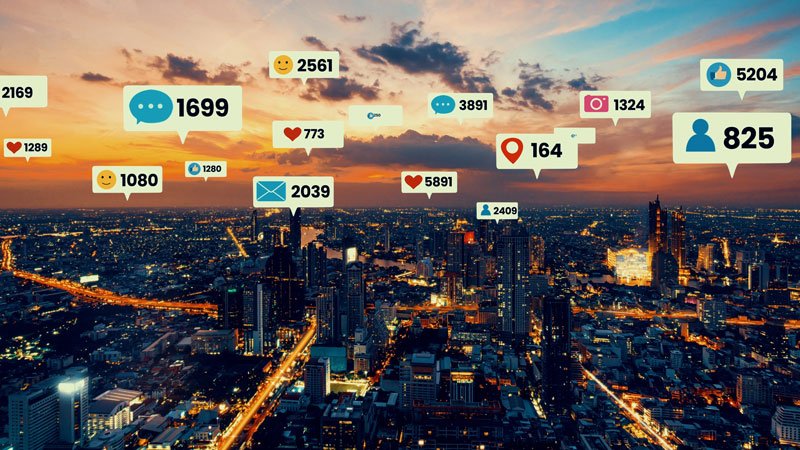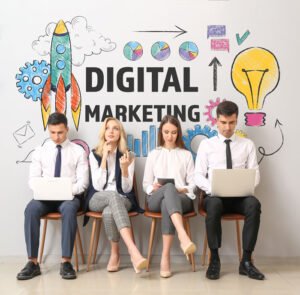Understanding Digital Marketing: The Past, Present, and Future
In today’s rapidly evolving digital landscape, understanding the nuances of digital marketing is crucial for businesses and consumers alike. This blog post explores how digital marketing works, its origins, applications, importance, and the potential impact of artificial intelligence on its future.

How Digital Marketing Works
Digital marketing encompasses all marketing efforts that use an electronic device or the internet. Businesses leverage digital channels such as search engines, social media, email, and websites to connect with current and prospective customers. At its core, digital marketing involves strategies like search engine optimization (SEO), content marketing, social media marketing, pay-per-click (PPC) advertising, and email marketing.
- Search Engine Optimization (SEO): SEO improves the visibility of a website in search engine results. By optimizing the content and structure of a site, businesses aim to appear higher in search results for relevant queries, driving organic traffic.
- Content Marketing: This strategy focuses on creating and distributing valuable content to attract and engage a target audience. Content marketing includes blogs, videos, infographics, and more.
- Social Media Marketing: Social platforms like Facebook, Instagram, and LinkedIn are used to promote products, engage with customers, and build brand awareness.
- Pay-Per-Click (PPC) Advertising: PPC involves advertisers paying a fee each time their ad is clicked. It’s a way of buying visits to a site rather than attempting to earn them organically.
- Email Marketing: Email campaigns are used to communicate directly with potential and current customers, promoting products, offering discounts, or sharing news.
What Digital Marketing Does
Digital marketing serves multiple purposes:
- Brand Awareness: By leveraging various online platforms, businesses can reach a broad audience and increase their brand visibility.
- Customer Engagement: Interactive content, social media, and personalized email campaigns foster stronger relationships with customers.
- Lead Generation: Effective digital marketing strategies attract potential customers and convert them into leads.
- Sales Growth: By targeting the right audience with compelling messages, digital marketing drives sales and revenue growth.

When Digital Marketing Started
Digital marketing’s roots trace back to the early days of the internet. The first clickable banner ad, launched in 1994 by HotWired, marked the beginning of online advertising. However, the term “digital marketing” gained popularity in the 2000s as the internet and technology advanced, leading to the development of more sophisticated online marketing strategies.
Where Digital Marketing Is Used
Digital marketing is ubiquitous in today’s world. It’s employed across various industries, including retail, healthcare, finance, entertainment, and education. Businesses use digital marketing to:
- Promote Products and Services: Online advertising, social media campaigns, and influencer partnerships help businesses reach their target market.
- Enhance Customer Experience: Personalized emails, chatbots, and user-friendly websites improve customer satisfaction and loyalty.
- Conduct Market Research: Digital tools allow companies to gather and analyze data on customer behavior, preferences, and trends.

Why Digital Marketing Is Important
Digital marketing is vital for several reasons:
- Cost-Effectiveness: Compared to traditional marketing methods, digital marketing is often more affordable and offers a higher return on investment.
- Measurability: Digital campaigns can be tracked and analyzed in real-time, allowing for data-driven decision-making.
- Targeted Reach: Advanced targeting options enable businesses to reach specific demographics and tailor their messages accordingly.
- Global Reach: The internet connects businesses with a worldwide audience, breaking geographical barriers.
Will Digital Marketing Be Replaced by AI?
Artificial intelligence (AI) is poised to transform digital marketing rather than replace it. AI enhances digital marketing in several ways:
- Data Analysis: AI can process vast amounts of data quickly, providing insights that inform marketing strategies.
- Personalization: Machine learning algorithms enable personalized customer experiences based on behavior and preferences.
- Automation: AI-powered tools automate repetitive tasks, such as email campaigns and social media posting, improving efficiency.
While AI will undoubtedly shape the future of digital marketing, human creativity and strategic thinking remain irreplaceable. Marketers will need to adapt by integrating AI tools while focusing on creating innovative and engaging content.
Conclusion
Digital marketing is an ever-evolving field that plays a crucial role in today’s business environment. From its humble beginnings in the 1990s to its current sophisticated strategies, digital marketing continues to drive brand awareness, customer engagement, and sales growth. As AI technology advances, it will enhance digital marketing efforts, making them more efficient and effective, but it will not replace the human element essential for creativity and strategic planning. Understanding and leveraging digital marketing is key to thriving in the digital age.
